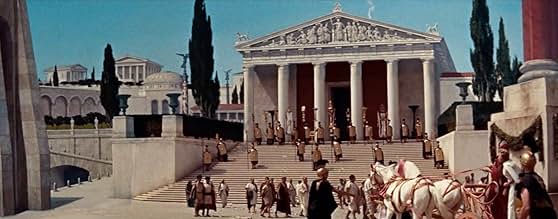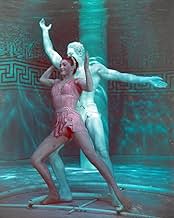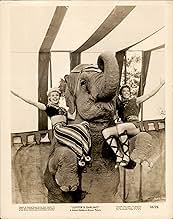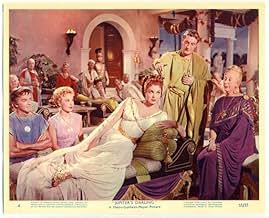NOTE IMDb
5,7/10
744
MA NOTE
Pour sauver la cité de Rome, menacée par les troupes d'Hannibal, la belle Amytis séduit le général carthaginois.Pour sauver la cité de Rome, menacée par les troupes d'Hannibal, la belle Amytis séduit le général carthaginois.Pour sauver la cité de Rome, menacée par les troupes d'Hannibal, la belle Amytis séduit le général carthaginois.
- Réalisation
- Scénario
- Casting principal
Chris Alcaide
- Cpl. Ballol
- (non crédité)
Fred Aldrich
- Soldier
- (non crédité)
Herman Belmonte
- Citizen
- (non crédité)
Ray Beltram
- Slave
- (non crédité)
Stanley Blystone
- Citizen
- (non crédité)
Avis à la une
JUPITER'S DARLING is an offbeat MGM musical with many entertaining elements. Famous as one of the musical flops of MGM's 1955 output (which included KISMET and IT'S ALWAYS FAIR WEATHER)which all but ended the MGM musical -as well as the contracts of some of its major participants- the movie generally received critical praise in its day and still has a "fan base" today. The credits for the film are eye-opening.It is based on a landmark play of 1927 entitled THE ROAD TO ROME which dealt humorously with Hannibal's march on Rome but was in fact a plea against war.It's author, Robert Sherwood, died the year of the film's release and amongst his other stage and screen work are titles such as The Petrified Forest,Idiot's Delight, Rebecca and The Best Years of Our Lives.Though much changed to accommodate the aquatic talents of Esther Williams and the form of the screen musical, generous amounts of Sherwood's witty and even racy dialogue survive. At a time when the period epic was in its full CinemaScope bloom (egs. THE ROBE, THE Egyptian) it's refreshing to see the genre being lampooned in such a tongue-in-cheek manner. Esther even spoofs her own underwater ballets in the I HAD A DREAM sequence (the best song in a somewhat underrated Burton Lane score)and has another dramatically exciting underwater scene in a later reel. Vocally strong as ever,Howard Keel is robust and virile as Hannibal (who in one funny scene reveals a fear of water and an inability to swim-surely an "in-joke" considering his co-star!)and the supporting cast (Marge and Gower Champion,George Sanders,Norma Varden,William Demarest and Richard Hayden) all get great moments. The direction is by one of MGM's best musical directors, George Sidney (The Harvey Girls, Show Boat, Pal Joey) and the inventive wide screen cinematography is by Paul C. Vogel and Charles G.Clarke,two of the best D.P.'s of the day. (Clarke shot CAROUSEL for Fox magnificently one year later).Written for the screen by MGM contractor Dorothy Kingsley (Seven Brides,Kiss me Kate)and budgeted at possibly the biggest figure for an MGM musical at that time, the film is a visual stunner with unique merits which outweigh its flaws.(One complaint- MGM cut the reprise of I HAVE A DREAM by Williams(dubbed) and Sanders (not dubbed) which was followed by a sizzling dance by the Champions.A faded out-take on the laserdisc edition at least allows buffs to view this now!)
I don't have many of the great MGM musicals of the 1940s and 50s in my video collection, but my interest in history resulted in my acquiring this decidedly minor work. I couldn't pass it up. Ancient history in American cinema tends (heavily) to be biblical history with a handful of glances at Ancient Egypt and Rome. Seriously, think of the best known titles: DeMille's THE TEN COMMANDMENTS [second version], SAMSON AND DELILAH, KING OF KINGS, THE SIGN OF THE CROSS, CLEOPATRA; THE EGYPTIAN; Joe Mankiewicz's CLEOPATRA; QUO VADIS (with Taylor, Kerr, and Ustinov); THE LAND OF THE PHAROAHS [with Joan Collins]. Films about ancient Greece are even rarer than this: THE FOUR HUNDRED SPARTANS (for the events leading to the defeat of Persia in 480 B.C.); HELEN OF TROY and ULYSSES (the latter actually an Italian film, but starring Kirk Douglas and Anthony Quinn); JASON AND THE ARGONAUTS. There are a few I've missed. Foreign cinemas have not been much better.
This film is about one of history's great military failures - Hannibal Barca, the Carthagenian tactical genius who is remembered for bringing his army over the alps (including his elephants - a feat of arms that is still marvelled at). He was of Phoenician ancestry, being from the city of Carthage in North Africa (founded by the Phoenicians). He probably was dark skinned, like most North Africans. He probably did not look like Howard Keel, a good actor and singer (KISS ME KATE, CALAMITY JANE - the latter as Wild Bill Hickok, THE DAY OF THE TRIFFIDS). Since this is a musical comedy the audience will swallow it, but from a historical realistic view the role cried for a singer and actor with a darker skin - someone like Paul Robson. However, for age reasons and political reasons Robson would have been impossible in 1955.
The basis of this film is Robert Sherwood's play, THE ROAD TO ROME, which was a comedy against war. Actually beyond this is the fact that Hannibal, having won five great victories against the Romans (capped by the total routs of Roman arms at Lake Transemene and Cannae) had the "road to Rome" open for his army - had he moved he would have destroyed Rome, and history would have been centered in North Africa for quite awhile. His dawdling lost him his chance, and the tactics of the Roman General Fabius Maximus (to snipe at Hannibal's army over a long period of time, until it was tired and demoralized) won the war after a decade. Fabius was killed in a skirmish, but his place was taken by Scipio Africanus, who delivered the knock-out blow at Zama in 202 B.C. Hannibal fled Carthage, to commit suicide in Macedonia a number of years later when he was about to be handed over to the Romans. Carthage was stripped of it's power and wealth, but nearly sixty years later it was purposely destroyed by the Romans (at the prodding of Cato the Elder, a bigotted Senator) in the pointless Third Punic "War". The population was killed or enslaved, and the town levelled - the site ploughed over with salt so nothing would ever grow there. Hence the bitter term: "Carthagenean Peace". But the memory of Rome's close call at the hands of this genius was a constant nightmare even at the height of their empire. In the AENIAD, Vergil has the doomed North African princess Dido die, praying that her descendant (Hannibal) destroys the Romans. Prior to the collapse of the Empire at the hands of "barbarian" tribes Hannibal was Rome's closest call to destruction.
This play may have been good in 1927, but it dates now. Moreover, Sherwood, despite some stage credits like IDIOT'S DELIGHT, is best remembered for his dual biography (which is still useful) ROOSEVELT AND HOPKINS, about FDR and his advisor Harry Hopkins. Keeping this in mind, my use of the term "minor" is understandable. It is not like a musical based on, say a play by Eugene O'Neill or Tennessee Williams. [Actually O'Neill plays have been turned into musicals: NEW GIRL IN TOWN is based on ANNA CRISTIE, and AH WILDERNESS! was turned into the musical TAKE ME ALONG.]
Williams and Keel are attractive together, but the Burton Lane score is not that good (a number with Marge and Gower Champion about the elephants seems very silly now). George Sanders gives his normally good performance, his Fabius being a mother-dominated type (momma is Norma Varden, who disapproves of his choice of Williams as a wife), but who is an intelligent military leader - witness how he realizes that the best way to fight Hannibal is not to present a pitched battle, but to wear him down. The action of the film is in 217 B.C., when the war was peaking for Hannibal, and Fabius did not die for nearly six years more. Interestingly enough Douglas Dumbrille has a brief part as Scipio, reminding us that the military affairs would remain in highly capable hands at the end. William Demerest is properly flustered a few times, constantly ready to give the signal for the final advance of the Carthageneans on Rome, only to find Hannibal unavailable or unwilling to tell him to do so. One wishes more had been done with Richard Haydn, as a historian named Horatio, but he seems wasted here. A film curiosity - not a great film though.
This film is about one of history's great military failures - Hannibal Barca, the Carthagenian tactical genius who is remembered for bringing his army over the alps (including his elephants - a feat of arms that is still marvelled at). He was of Phoenician ancestry, being from the city of Carthage in North Africa (founded by the Phoenicians). He probably was dark skinned, like most North Africans. He probably did not look like Howard Keel, a good actor and singer (KISS ME KATE, CALAMITY JANE - the latter as Wild Bill Hickok, THE DAY OF THE TRIFFIDS). Since this is a musical comedy the audience will swallow it, but from a historical realistic view the role cried for a singer and actor with a darker skin - someone like Paul Robson. However, for age reasons and political reasons Robson would have been impossible in 1955.
The basis of this film is Robert Sherwood's play, THE ROAD TO ROME, which was a comedy against war. Actually beyond this is the fact that Hannibal, having won five great victories against the Romans (capped by the total routs of Roman arms at Lake Transemene and Cannae) had the "road to Rome" open for his army - had he moved he would have destroyed Rome, and history would have been centered in North Africa for quite awhile. His dawdling lost him his chance, and the tactics of the Roman General Fabius Maximus (to snipe at Hannibal's army over a long period of time, until it was tired and demoralized) won the war after a decade. Fabius was killed in a skirmish, but his place was taken by Scipio Africanus, who delivered the knock-out blow at Zama in 202 B.C. Hannibal fled Carthage, to commit suicide in Macedonia a number of years later when he was about to be handed over to the Romans. Carthage was stripped of it's power and wealth, but nearly sixty years later it was purposely destroyed by the Romans (at the prodding of Cato the Elder, a bigotted Senator) in the pointless Third Punic "War". The population was killed or enslaved, and the town levelled - the site ploughed over with salt so nothing would ever grow there. Hence the bitter term: "Carthagenean Peace". But the memory of Rome's close call at the hands of this genius was a constant nightmare even at the height of their empire. In the AENIAD, Vergil has the doomed North African princess Dido die, praying that her descendant (Hannibal) destroys the Romans. Prior to the collapse of the Empire at the hands of "barbarian" tribes Hannibal was Rome's closest call to destruction.
This play may have been good in 1927, but it dates now. Moreover, Sherwood, despite some stage credits like IDIOT'S DELIGHT, is best remembered for his dual biography (which is still useful) ROOSEVELT AND HOPKINS, about FDR and his advisor Harry Hopkins. Keeping this in mind, my use of the term "minor" is understandable. It is not like a musical based on, say a play by Eugene O'Neill or Tennessee Williams. [Actually O'Neill plays have been turned into musicals: NEW GIRL IN TOWN is based on ANNA CRISTIE, and AH WILDERNESS! was turned into the musical TAKE ME ALONG.]
Williams and Keel are attractive together, but the Burton Lane score is not that good (a number with Marge and Gower Champion about the elephants seems very silly now). George Sanders gives his normally good performance, his Fabius being a mother-dominated type (momma is Norma Varden, who disapproves of his choice of Williams as a wife), but who is an intelligent military leader - witness how he realizes that the best way to fight Hannibal is not to present a pitched battle, but to wear him down. The action of the film is in 217 B.C., when the war was peaking for Hannibal, and Fabius did not die for nearly six years more. Interestingly enough Douglas Dumbrille has a brief part as Scipio, reminding us that the military affairs would remain in highly capable hands at the end. William Demerest is properly flustered a few times, constantly ready to give the signal for the final advance of the Carthageneans on Rome, only to find Hannibal unavailable or unwilling to tell him to do so. One wishes more had been done with Richard Haydn, as a historian named Horatio, but he seems wasted here. A film curiosity - not a great film though.
Esther Williams, Howard Keel, and husband-and-wife dancing team Marge and Gower Champion star in this musical about Hannibal. I went into this a little wary, but wanted to see one of Esther's lesser-known films. Granted, it may have earned a somewhat campy and corny reputation, but I found as I got deeper and deeper into it, that I really enjoyed it. What's a little ingenious about it, is that they worked in an Esther Williams swimming interlude in a dramatic way, as she is being chased. And, the great supporting cast of George Sanders, William Demarest, Douglas Dumbrille and Richard Haydn helps a lot. And, both Howard Keel and Esther are very believable as these mythological characters, she so beautiful and he so big, virile, and commanding. This is the type of film, that one will have the dialogue and especially the songs memorized from watching this over and over, because it's so much of a guilty pleasure. I definitely am going to see this again soon. I was going to give this a seven, given the fact this isn't one of Esther's top successes, but it's just so enjoyable, that I give it an '8.' After all, who cares what movie critics think? Just sit back and enjoy the histrionics of Hannibal and Amytis. By the way, do you think this is accurate?
Unless someone tells you in advance that "Jupiter's Darling" is a spoof, you may be like me and wonder through the first part of the film exactly what you are watching. I thought it was a badly made "serious" musical. And I wonder if calling it a "spoof" forgives a film for its bad elements? Bad dancing. Stilted lyrics. Questionable artistic choices. Awkward moments. The beginning of this film is plagued with them. Once you take the film to be a spoof, some of them can be forgiven--IF you are sure that the silliness is intentional. I am not sure all of it is.
When Esther Williams sings "I Had a Dream", you might be surprised to hear her sing. I was. Then I learned that it was dubbed by Jo Ann Greer. Good choice of singer, because it sounds like Esther's voice. Note that she sings while swimming. That's a little awkward. And then the number turns (appropriately) into a dream sequence. Even if you find the film less than excellent, it's a number that is interesting--filmed to give the illusion that it was done without coming up for air.
Howard Keel, as Hannibal, is the romantic interest. He lends his booming voice to some silly lyrics. I had the recurring impression I was listening to The Grinch.
Another interesting thing: the opening line of one song ("Don't Let This Night Get Away") sounded remarkably like the opening line of "A Woman in Love" from "Guys and Dolls", released the same year.
Besides the underwater dance sequence I mentioned, there is another that is worth seeing for its uniqueness. Marge and Gower Champion sing "The Life of an Elephant" while dancing among elephants that perform tricks. Both sequences must have been tedious to film.
One element that that I found superior throughout was the costuming.
When Esther Williams sings "I Had a Dream", you might be surprised to hear her sing. I was. Then I learned that it was dubbed by Jo Ann Greer. Good choice of singer, because it sounds like Esther's voice. Note that she sings while swimming. That's a little awkward. And then the number turns (appropriately) into a dream sequence. Even if you find the film less than excellent, it's a number that is interesting--filmed to give the illusion that it was done without coming up for air.
Howard Keel, as Hannibal, is the romantic interest. He lends his booming voice to some silly lyrics. I had the recurring impression I was listening to The Grinch.
Another interesting thing: the opening line of one song ("Don't Let This Night Get Away") sounded remarkably like the opening line of "A Woman in Love" from "Guys and Dolls", released the same year.
Besides the underwater dance sequence I mentioned, there is another that is worth seeing for its uniqueness. Marge and Gower Champion sing "The Life of an Elephant" while dancing among elephants that perform tricks. Both sequences must have been tedious to film.
One element that that I found superior throughout was the costuming.
Believe it or not, there's actually a song whose lyrics sing, "If this be slavery, then give me slavery. If this be slavery, I don't want to be free!" Not only did someone think to write it, but the song was given the green light by Hollywood producers, put into a film, performed by the dance duo Marge and Gower Champion, and not cut from the final film! That should give you an idea as to the quality of music featured in the Esther Williams vehicle Jupiter's Darling.
Esther Williams is engaged to Roman leader George Sanders, but she's drawn to Howard Keel, who's made it his mission to attack and conquer Rome. It's quite a love triangle, because Howard Keel isn't the most likable guy ever written, but he sings powerfully seductive songs and even picks up and moves a real leopard guarding Esther's bed! My one question is why didn't George Sanders get any songs? He showed off his beautiful voice in Call Me Madam, but maybe Hollywood didn't want to give Howard Keel any competition-not that he'd really have any. He's clearly the manly macho one in the movie, and he's scantily dressed, giving audiences an up close and personal view of his macho manliness.
Still, while Howard Keel is able to save a couple of songs in the movie, unless you're an Esther Williams fan, you probably won't end up renting this one. Underwater dancing is a very specialized talent, one that not everyone likes to watch. Then again, you might get a kick out of Richard Haydn sounding very much like his famous Caterpillar role from Alice in Wonderland. Or, you might enjoy looking at Howard Keel in a Greek warrior outfit that barely fits him. One more thing: This is a little criticism, but I do have it-there's a Marge and Gower Champion song performed alongside a couple of elephants, and I couldn't help but feel sorry for the animals. One was supposed to fall over and roll around, while the dancers make fun of it, but to me, it wasn't cute.
Esther Williams is engaged to Roman leader George Sanders, but she's drawn to Howard Keel, who's made it his mission to attack and conquer Rome. It's quite a love triangle, because Howard Keel isn't the most likable guy ever written, but he sings powerfully seductive songs and even picks up and moves a real leopard guarding Esther's bed! My one question is why didn't George Sanders get any songs? He showed off his beautiful voice in Call Me Madam, but maybe Hollywood didn't want to give Howard Keel any competition-not that he'd really have any. He's clearly the manly macho one in the movie, and he's scantily dressed, giving audiences an up close and personal view of his macho manliness.
Still, while Howard Keel is able to save a couple of songs in the movie, unless you're an Esther Williams fan, you probably won't end up renting this one. Underwater dancing is a very specialized talent, one that not everyone likes to watch. Then again, you might get a kick out of Richard Haydn sounding very much like his famous Caterpillar role from Alice in Wonderland. Or, you might enjoy looking at Howard Keel in a Greek warrior outfit that barely fits him. One more thing: This is a little criticism, but I do have it-there's a Marge and Gower Champion song performed alongside a couple of elephants, and I couldn't help but feel sorry for the animals. One was supposed to fall over and roll around, while the dancers make fun of it, but to me, it wasn't cute.
Le saviez-vous
- AnecdotesWilliams refused to do the scene where Amytis rides a horse off a cliff and MGM refused to cut the scene. Platform diver Al Lewin did the stunt in one take - and broke his back in the process.
- GaffesDuring the "slave market" dance number Marge Champion at one point has a small basket on her head. It falls off and lands on the ground between her and Gower. They pull in for a closeup and when they pull back the basket is gone.
- Crédits fousIn opening credits: "In 216 B.C., Hannibal the Barbarian marched on Rome. The history of this great march has always been confused. This picture will do nothing to clear it up."
- ConnexionsFeatured in 1955 Motion Picture Theatre Celebration (1955)
- Bandes originalesHoratio's Narration
(uncredited)
Music by Saul Chaplin
Lyrics by George Wells, Harold Adamson and Saul Chaplin
Sung by Richard Haydn
Meilleurs choix
Connectez-vous pour évaluer et suivre la liste de favoris afin de recevoir des recommandations personnalisées
- How long is Jupiter's Darling?Alimenté par Alexa
Détails
Box-office
- Budget
- 3 337 000 $US (estimé)
- Durée
- 1h 35min(95 min)
- Rapport de forme
- 2.55 : 1
Contribuer à cette page
Suggérer une modification ou ajouter du contenu manquant



































